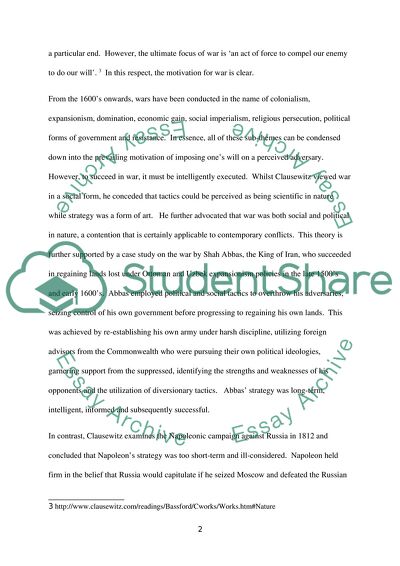
- Home
- Free Samples
- Premium Essays
- Editing Services
- Extra Tools
- Essay Writing Help
- About Us
- Studentshare
- Subjects
- Miscellaneous
- The Train Wreck of Revolution
The Train Wreck of Revolution - Essay Example

- Subject: Miscellaneous
- Type: Essay
- Level: Masters
- Pages: 4 (1000 words)
- Downloads: 0
- Author: tristonrolfson
Extract of sample "The Train Wreck of Revolution"
roader historical engagements2, without examining historical motivations for war, he exposes himself as failing to recognize the social context of any given era. Whilst recognizing that history exposes tumultuous change and evolution, the fundamental principles driving war remain consistent and one of those principles is cause. For war to occur, causality is integral to how a war campaign is waged, how it is won or lost and how decisions are made which ultimately determine the outcome. War can be defined as any aggressive movement towards an adversary, from the threat of force to coerce an opponent into submission to conflicts which ensure the annihilation of any resistance from the targeted enemy.
Both can ensure the deconstruction of the military and political power of an enemy, which is the principle outcome of any conflict, civil or international. The characteristics of war remain consistent: they are similar to any social interaction between individuals whereby human defects and virtues are employed to achieve a particular end. However, the ultimate focus of war is ‘an act of force to compel our enemy to do our will’. 3 In this respect, the motivation for war is clear. From the 1600’s onwards, wars have been conducted in the name of colonialism, expansionism, domination, economic gain, social imperialism, religious persecution, political forms of government and resistance.
In essence, all of these sub-themes can be condensed down into the prevailing motivation of imposing one’s will on a perceived adversary. However, to succeed in war, it must be intelligently executed. Whilst Clausewitz viewed war in a social form, he conceded that tactics could be perceived as being scientific in nature while strategy was a form of art. He further advocated that war was both social and political in nature, a contention that is certainly applicable to contemporary conflicts.
This theory is further supported by a case study on the war by Shah Abbas, the
...Download file to see next pages Read MoreCHECK THESE SAMPLES OF The Train Wreck of Revolution
Thomas Kuhn`s Pradigm theory
Khomeini vs. the International Community
The Devolution of Greek Economy
Women and Economics in Colonial and Post Revolution America
Evolution of Genetics: From Philosophy to Science
The French Revolution and the Cultural Renewal of Europe
Women`s Rights in the Colonies and During American Revolution
Criticism of Needhams Views on Scientific Revolution in China

- TERMS & CONDITIONS
- PRIVACY POLICY
- COOKIES POLICY